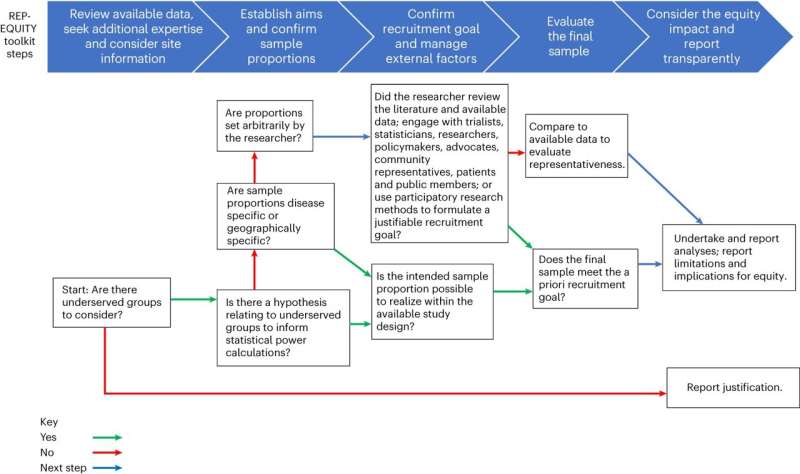This article has been reviewed according to Science X's editorial process and policies. Editors have highlighted the following attributes while ensuring the content's credibility:
fact-checked
peer-reviewed publication
trusted source
proofread
Toolkit helps researchers develop more equitable and representative research

Without representative participation, clinical trials cannot accurately reflect how medical interventions impact patients—introducing bias and affecting research quality. This can result in reluctance to offer treatments to specific groups, contributing to health inequality.
Researchers at the University of Birmingham have developed the REP-EQUITY toolkit to guide representative and equitable inclusion in clinical research. The toolkit describes seven key questions for investigators to consider when recruiting people to take part in their trials:
- What are the relevant underserved groups?
- What is the aim in relation to representativeness and equity? For example, do researchers want to include participants representing the general population, or do they have particular focus on people from groups experiencing poorer health outcomes?
- How will sample proportion of individuals with underserved characteristics be defined?
- What are the recruitment goals?
- How will external factors be managed?
- How will representation be evaluated?
- What will be the legacy?
Publishing their work in Nature Medicine, the researchers note that individuals and groups can be underserved by research for several reasons—such as on the basis of demographic (age, ethnicity, gender identity), social and economic (employment, living in remote areas, educational attainment), disease-specific factors (those with rare diseases) or health status (mental health conditions, multi-morbidities, pregnancy).
Lead author Dr. Ameeta Retzer from the NIHR Birmingham Biomedical Research Center, University of Birmingham, commented, "There is a growing emphasis placed on representative inclusion in research—both by the public and research funders. It is vital that we develop a practical and evidence-based approach to capturing inclusive and representative research samples.
"We believe our new toolkit is an important contribution, building upon and complementing existing work. It will help clinical researchers to minimize bias and promote equity, while building consent and trust between underserved groups and research institutions. This could be a major step towards securing better and fairer health outcomes for underrepresented groups and individuals."
Trial participant diversity
While improving clinical trial participant diversity is increasingly prioritized, the COVID-19 pandemic accelerated the need to generalize research findings to groups experiencing the greatest health burden.
For example, minority populations—such as Black African & Caribbean and South East Asian groups in the UK and Black, Hispanic, and Native American communities in the US—experienced disproportionate risk of severe COVID-19 complications and death, yet were underrepresented in COVID-19 research. Similarly, others including those from lower socio-economic backgrounds and pregnant people were underserved by COVID-19 research.
Developing the toolkit coincided with significant technological advances in the use of global data—using phenotype specification, systematic code-searching, iterative and clinical review, and analysis of prevalence and validation to create research cohorts that are representative of the real-world population.
The researchers plan to further validate and pilot the REP-EQUITY toolkit and track its global use—developing an evidence base to promote its usefulness and testing its use with pooled routinely collected real-world data to explore equitable sampling of people from underserved groups.
More information: Ameeta Retzer et al, A toolkit for capturing a representative and equitable sample in health research, Nature Medicine (2023). DOI: 10.1038/s41591-023-02665-1



















